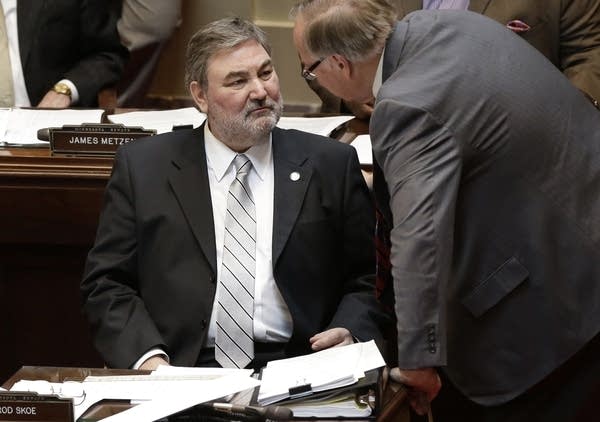Heavy lifting on budget still needed at Capitol
Go Deeper.
Create an account or log in to save stories.
Like this?
Thanks for liking this story! We have added it to a list of your favorite stories.

With the same-sex marriage bill now passed and signed into law, state lawmakers are again turning their attention to passing a state budget before next Monday's scheduled session adjournment.
The Democrats in charge of the House and Senate tax committees must determine a combination of new tax increases that will raise $2 billion.
Gov. Mark Dayton and DFL legislative leaders, who set that target, announced a tax and spending framework Sunday. But many details of that agreement have yet to be worked out, including an income tax surcharge, a liquor tax increase and a sales tax expansion to some business services.
Senate Tax Chair Rod Skoe said the final bill needs to erase a projected $627 million budget deficit and pay for new investments in public education, as well as property tax relief.
Turn Up Your Support
MPR News helps you turn down the noise and build shared understanding. Turn up your support for this public resource and keep trusted journalism accessible to all.
"We'll add all that up and see where we end up," said Skoe, DFL-Clearbrook. "We'll start with the income tax, I'm going to guess, and then we'll see how much revenue has to come out of the other revenues."
The income tax increase kicks in on taxable income above $250,000 for couples and $150,000 for individuals. The rate for that new fourth tier still has to be determined.
House and Senate negotiators also will determine the size of a cigarette tax increase and which business-to-business transactions will be subject to the state sales tax.
"This is taxes gone wild. This is spending gone wild... There's no balance."
House Tax Chair Ann Lenczewski said the list of those transactions will come from the Senate tax bill.
"I think the biggest two are computer software and warehousing, as far as price tags go," said Lenczewski, DFL-Bloomington. "But there are a number of smaller provisions. The problem is, in the Senate tax bill they have both "b-to-b" sales tax expansions and final consumption sales tax expansions. So, you can't look at their list and say, boy we can use any of that, because the governor and the deal said no final consumption sales taxes."
Negotiators also will have to finalize a temporary income tax surcharge to deliver $850 million in delayed payments to school districts, the so-called school funding shift included in previous budget deals.
The House tax bill included a 4 percent surcharge on incomes above $500,000. But the agreement called for a smaller percentage.
Asked about other potential sticking points, Lenczewski pointed to the House plan to increase taxes on beer, wine and liquor.
"We want the Senate to come to our viewpoint on understanding that the costs of alcohol use are high to state government, and we'd like the users to recoup some of those costs," she said.
But when it comes to alcohol taxes, Skoe isn't budging.
"I think the alcohol tax is a no," he said. "The Senate has not been supportive of that."
Republicans don't like any of the DFL tax proposals and say the increases will be bad for businesses.
"This is taxes gone wild. This is spending gone wild," said state Rep. Greg Davids, R-Preston. "There's no balance. There's no way to control it from the Republican standpoint because it's all DFL controlled, and they will own every one of the taxes that hurt businesses in Minnesota."
Resolution of the tax bill won't come until work is complete on all the individual spending bills. Lawmakers also will act on an $800 million bonding bill, which was another piece of the weekend budget agreement.
A borrowing package for public construction projects would need some Republican votes in both chambers to reach the 60 percent majority required for passage. Senate Minority Leader David Hann said he doesn't believe those votes are there.
"We're not inclined to support a bonding bill this year," said Hann, R-Eden Prairie. "We think if we're going to do more bonding projects, next year is the time to do it."
State Rep. Alice Hausman, chair of the House Capital Investment Committee, said she believes there will be Republican votes. She described GOP threats to the contrary as "leadership rhetoric."
"We have people who have told us they are absolute yes votes for this," said Hausman, DFL-St. Paul. "So, I have to trust they have the best interest of their region in mind."
Lawmakers also are still considering a proposed gas tax increase passed by the Senate. However the House did not pass an increase, and Dayton doesn't support it.
Dear reader,
Political debates with family or friends can get heated. But what if there was a way to handle them better?
You can learn how to have civil political conversations with our new e-book!
Download our free e-book, Talking Sense: Have Hard Political Conversations, Better, and learn how to talk without the tension.




